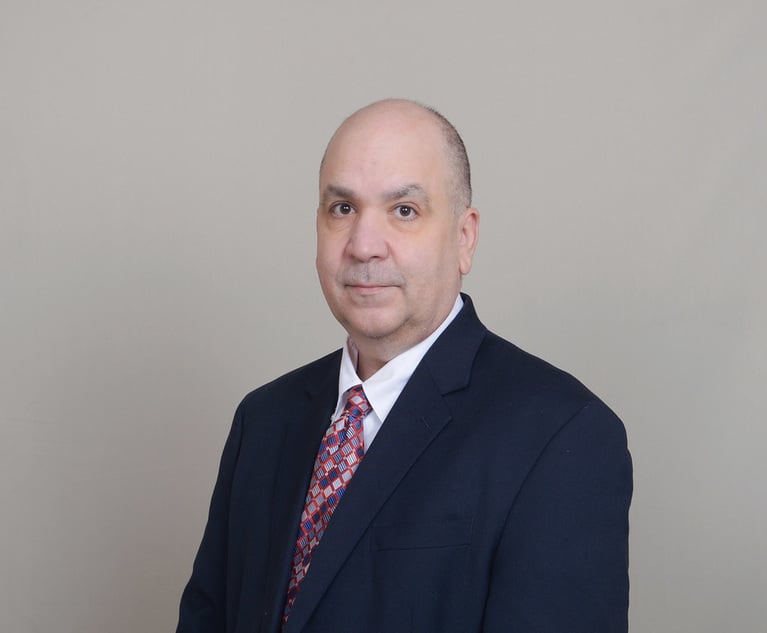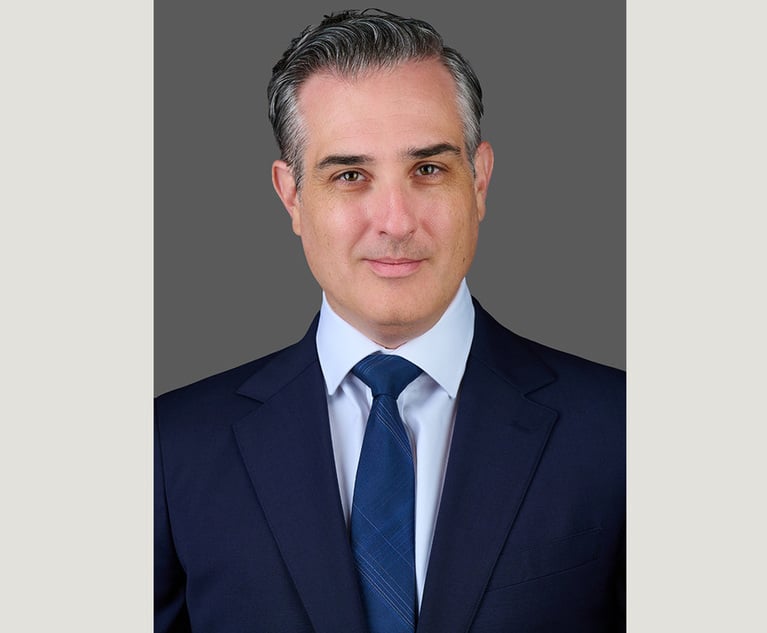Reed Smith Launches Tech Program for Select Summer Associates
In a new twist on law firms' race to innovate, five summer associates in the United States and the U.K. will take on projects aimed at applying technology to legal services.
April 19, 2018 at 07:00 AM
3 minute read
The original version of this story was published on The American Lawyer

Reed Smith wants to start training its lawyers to be technology innovators from the first day they arrive at the firm.
This summer, the 1,500-attorney firm will divert five summer associates into a new program where they will work on developing projects that use tech to improve legal services.
That's in addition to the traditional research and writing work attached to summer programs for law students.
“We want to start developing lawyers that are not only great lawyers, but also understand how technology can deliver services more efficiently and more collaboratively and can offer new solutions for clients,” said Reed Smith chief knowledge officer Lucy Dillon.
The firm picked three students from American law schools and two from British law schools for the inaugural Legal Technology Summer Associate Program, which Dillon said is the first of its kind. Overall, the firm expects to have as many as 60 summer associates in the United States in 2018.
“A number of firms have trained their lawyers to code or have had programs to train up the lawyers they already have,” Dillon said. “But I'm not aware of any law firms recruiting into their summer associate program students who have an interest and an appetite in this and have demonstrated that by taking classes or doing programs with a legal technology focus.”
Reed Smith looked to law schools with strong legal technology curricula to recruit its first tech-focused summers. In the United States, the firm tapped 2Ls Danielle Chirdon from Michigan State University College of Law and Arthur Surratt from Chicago-Kent College of Law, and 1L Tyler Siminski from the University of Pittsburgh School of Law. The U.K. participants have not yet been selected.
Along with participating in their schools' technology programs, the U.S. trio all have completed academic coursework in computer science.
The five summer associates will work out of Chicago, Pittsburgh and London, and the firm hopes to expand the program to additional offices by next summer.
Dillon outlined several potential projects that the budding attorneys might wind up working on. One involves the application of blockchain to real estate transactions, and another involves improving artificial intelligence tools for document review.
She said the program will be deemed successful if the summer associates' expertise helps to move the projects forward, while also gaining them a positive experience with the firm. But even if the projects turn out to be duds, the program still will provide dividends.
“To have someone spend sometime on a project and report back that this isn't a runner, that's time well spent as well,” Dillon said.
The initiative comes as firms are increasingly competing with one another—and with alternative legal services providers—on the innovation front. And the new summer associate program is not the only way Reed Smith is working to bolster its artificial intelligence capabilities. It is also involved in a partnership with AI contract review platform Heretik, trading training hours and access to the firm's data for an ownership interest in the startup.
The announcement also comes after the firm revealed earlier this month that in July it will be opening a new back office in Leeds, England, Reed Smith Global Solutions, which will offer a records and e-discovery practice as well as support services for its operations in Europe, the Middle East and Asia.
This content has been archived. It is available through our partners, LexisNexis® and Bloomberg Law.
To view this content, please continue to their sites.
Not a Lexis Subscriber?
Subscribe Now
Not a Bloomberg Law Subscriber?
Subscribe Now
NOT FOR REPRINT
© 2025 ALM Global, LLC, All Rights Reserved. Request academic re-use from www.copyright.com. All other uses, submit a request to [email protected]. For more information visit Asset & Logo Licensing.
You Might Like
View All
People in the News—Jan. 9, 2025—Rawle & Henderson, Armstrong Teasdale
3 minute read


Phila. Court System Pushed to Adapt as Justices Greenlight Changes to Pa.'s Civil Jury Selection Rules
5 minute readTrending Stories
Who Got The Work
Michael G. Bongiorno, Andrew Scott Dulberg and Elizabeth E. Driscoll from Wilmer Cutler Pickering Hale and Dorr have stepped in to represent Symbotic Inc., an A.I.-enabled technology platform that focuses on increasing supply chain efficiency, and other defendants in a pending shareholder derivative lawsuit. The case, filed Oct. 2 in Massachusetts District Court by the Brown Law Firm on behalf of Stephen Austen, accuses certain officers and directors of misleading investors in regard to Symbotic's potential for margin growth by failing to disclose that the company was not equipped to timely deploy its systems or manage expenses through project delays. The case, assigned to U.S. District Judge Nathaniel M. Gorton, is 1:24-cv-12522, Austen v. Cohen et al.
Who Got The Work
Edmund Polubinski and Marie Killmond of Davis Polk & Wardwell have entered appearances for data platform software development company MongoDB and other defendants in a pending shareholder derivative lawsuit. The action, filed Oct. 7 in New York Southern District Court by the Brown Law Firm, accuses the company's directors and/or officers of falsely expressing confidence in the company’s restructuring of its sales incentive plan and downplaying the severity of decreases in its upfront commitments. The case is 1:24-cv-07594, Roy v. Ittycheria et al.
Who Got The Work
Amy O. Bruchs and Kurt F. Ellison of Michael Best & Friedrich have entered appearances for Epic Systems Corp. in a pending employment discrimination lawsuit. The suit was filed Sept. 7 in Wisconsin Western District Court by Levine Eisberner LLC and Siri & Glimstad on behalf of a project manager who claims that he was wrongfully terminated after applying for a religious exemption to the defendant's COVID-19 vaccine mandate. The case, assigned to U.S. Magistrate Judge Anita Marie Boor, is 3:24-cv-00630, Secker, Nathan v. Epic Systems Corporation.
Who Got The Work
David X. Sullivan, Thomas J. Finn and Gregory A. Hall from McCarter & English have entered appearances for Sunrun Installation Services in a pending civil rights lawsuit. The complaint was filed Sept. 4 in Connecticut District Court by attorney Robert M. Berke on behalf of former employee George Edward Steins, who was arrested and charged with employing an unregistered home improvement salesperson. The complaint alleges that had Sunrun informed the Connecticut Department of Consumer Protection that the plaintiff's employment had ended in 2017 and that he no longer held Sunrun's home improvement contractor license, he would not have been hit with charges, which were dismissed in May 2024. The case, assigned to U.S. District Judge Jeffrey A. Meyer, is 3:24-cv-01423, Steins v. Sunrun, Inc. et al.
Who Got The Work
Greenberg Traurig shareholder Joshua L. Raskin has entered an appearance for boohoo.com UK Ltd. in a pending patent infringement lawsuit. The suit, filed Sept. 3 in Texas Eastern District Court by Rozier Hardt McDonough on behalf of Alto Dynamics, asserts five patents related to an online shopping platform. The case, assigned to U.S. District Judge Rodney Gilstrap, is 2:24-cv-00719, Alto Dynamics, LLC v. boohoo.com UK Limited.
Featured Firms
Law Offices of Gary Martin Hays & Associates, P.C.
(470) 294-1674
Law Offices of Mark E. Salomone
(857) 444-6468
Smith & Hassler
(713) 739-1250





